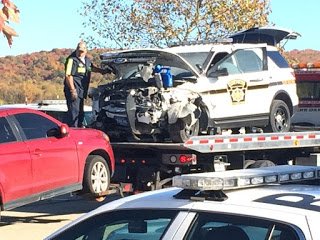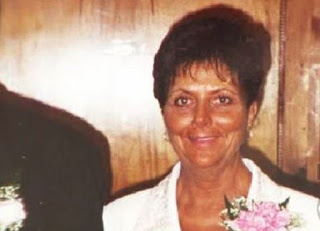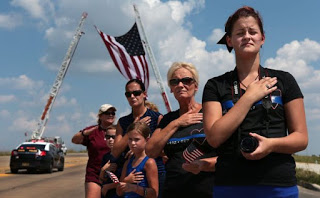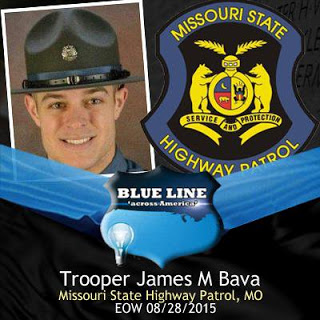Friday, December 4, 2015
“Blue Privilege” and the Felony Murder Rule

Bendetta Miller died on October 25 as a result of what was accurately described as a “senseless act” in Fayette County, Pennsylvania. Her husband’s bereavement was compounded by the knowledge that he had spoken with her by phone just minutes before he died – and the thought that if that conversation had been drawn out by mere seconds, Brenda might have avoided the automobile collision in which she was fatally wounded.
“If I could have delayed her, if I would have talked with her longer, she would have probably been with me today,” Gary Miller laments, describing a phone call with his wife while she was shopping at a nearby mall. “When I hung up, I said, `I’ll see you this evening when I get home.’ It never happened.”
 |
| Victim of police recklessness: Bendetta Miller. |
A few minutes after that phone call, the SUV Bendetta was driving was blind-sided at an intersection by a vehicle operated by a man named Scott Abbott. She apparently didn’t see Abbott’s car. For his part, Abbott was driving well above the speed limit, and didn’t have time to avoid the fatal crash. Brenda was flown to a nearby hospital, where she died as a result of her injuries.
Criminal homicide charges have been filed as a result of Bendetta’s death. The suspect was not Pennsylvania State Trooper Scott Abbott, the man who killed her, but 23-year-old Jonathan Switch, the individual Abbott was pursuing. Abbott joined the chase after Switch – who had been driving with a suspended license – fled from a traffic stop.
Gary Miller referred to his wife’s death as the result of a “senseless … high-speed chase.” Given that the troopers were engaging in tax collection, rather than the pursuit of a suspected violent felon, a better description of their actions would be “criminally irresponsible.”
 |
| No bail: Switch. |
When operated recklessly in ways that endanger members of the state’s enforcement caste, motor vehicles are treated as lethal weapons. As is always the case, there is no reciprocal application of this principle when police engage in reckless driving that endangers or ends the lives of innocent people.
One appropriately infuriating example of this variable standard is found in the decision by the Los Angeles County Prosecutor’s Office not to charge LA County Sheriff’s Deputy Andrew Wood after he ran over 65-year-old tech executive Milton Olin, Jr. in December 2013. Deputy Wood was distracted by answering a computer text message at the time he ran over Olin, who was riding a bicycle.
In keeping with the reasonably low expectations observant people have for those in his profession, Deputy Wood initially lied about the incident, claiming that Olin had “drifted” out of the bike lane. He will be held responsible for neither the killing nor for his subsequent perjury because the prosecutor ruled that Wood was answering a “work-related” text message. Thus his all-encompassing professional privilege protects him from legal liability for an incident that would otherwise have been prosecuted as a criminal homicide.
| No charges: The scene after Deputy Wood killed Olin. |
The case of Jonathan Switch represents an even more egregious form of Blue Privilege, since he is being held legally liable for the fatal misconduct of another driver. Furthermore, his case is not unique.
On August 28, Missouri State Trooper died when he crashed his patrol vehicle while giving pursuit to a speeding motorcyclist, later identified as twenty-year-old Serghei Pavel Comerzan.
In late November, Comerzan was arrested and charged with resisting a lawful stop, careless and imprudent driving, and failure to register a motor vehicle. Owing largely, if not entirely, to the privileged status of the individual who died while pursuing him, Comerzan was also charged with second-degree murder (or, alternatively, first-degree manslaughter), despite the fact that Trooper Bava’s own actions were the proximate cause of his own death.
Under the common law principle called the “felony murder rule,” an accidental killing that occurs during the course of a “dangerous felony” can be charged as first-degree murder. For example, the driver of a get-away car following an armed robbery can be charged with murder even if he didn’t pull the trigger when the bank teller was shot.
 |
| Obligatory media “perp” photo of Comerzan. |
The most recent revision of the Missouri statute dealing with second-degree murder specifies that the charge is appropriate when the accused “knowingly causes the death of another person,” acts “with the purpose of causing serious physical injury to another person,” or “Commits or attempts to commit any felony….” Since the prosecution would have great difficulty proving that Comerzan intended to kill or injure Bava, they would probably rely on a subtle situational sentence enhancement found in one of the misdemeanor statutes the driver is accused of violating.
Both “careless and imprudent driving” and “failure to register a vehicle” are misdemeanors. The same is true of “resisting a lawful stop” – except in circumstances in which “the person fleeing creates a substantial risk of physical injury or death to any person, in which case it is a class E felony,” according to the statute. Unlike other states, Missouri’s version of the felony murder rule doesn’t require that the underlying felony be an “inherently dangerous” offense, such as unlawful discharge of a firearm or arson.
Interestingly, a decade ago the California Supreme Court ruled that driving with “willful or wanton disregard for persons or property while fleeing from a pursuing police officer” is not an “inherently dangerous crime” for the purpose of the felony murder rule.
 |
| Spectators at Trooper Bava’s funeral procession. |
That ruling was the result of a 2002 case in which an ex-convict named Evert Keith Howard, fleeing from police, plowed a stolen Chevy Tahoe into a car driven by Jeanette Rodriguez, killing the driver and seriously injuring her husband. Noting that the “second-degree felony-murder rule is a court-made rule [without] statutory definition,” the court reversed Howard’s murder conviction under that rule while acknowledging that a trial jury “may well find that the motorist has acted with malice by driving with conscious disregard for the lives of others, and this is guilty of murder.”
By charging Comerzan with both second degree murder and manslaughter, the prosecution could very well be using the threat of the former to extract a plea agreement to the latter. Under Missouri state law, “the crime of involuntary manslaughter in the first degree” occurs when an individual “recklessly causes the death of another person.”
 |
| Of course he was a hero; aren’t they all? |
Although Bava perceived a duty to conduct a dangerous pursuit of Comerzan, the motorcyclist did not compel the trooper to follow him. Indeed, in the case from California, Fresno Police Officer Anthony Arcelus – who later witnessed the fatal crash at a stoplight – decided to give up the pursuit “fearing that the high-speed chase might cause an accident.”
There is no dispute, however, that the late Trooper Bava’s colleague in the Missouri Highway Patrol, Trooper Anthony Piercy, recklessly caused the unjustifiable death of twenty-year-old Brandon Ellingson. After being arrested on suspicion of boating while intoxicated, Ellingson was handcuffed, placed into a defective life-vest, and then thrown overboard into Lake of the Ozarks, where he drowned.
“Brandon Ellingson didn’t have a chance the moment he got on that boat,” concludes recently retired MHP Sergeant Randy Henry, who was Piercy’s supervisor at the time and interviewed him hours after the May 2014 incident. “As soon as Brandon Ellingson got onto Tony Piercy’s boat, I believe it was a death march.” Piercy’s actions amounted to “manslaughter, involuntary manslaughter,” Henry concludes.
 |
| Honest remorse: Former Trooper Henry. |
“This happened on our watch,” Henry told the Des Moines NBC affiliate, KCCI.” It shouldn’t have happened. It was totally preventable and it was covered up. He was totally defenseless in that boat.”
The cover-up and predictable pressure campaign resulted in a ruling from a Coroner’s Inquest that Ellingson’s death was accidental – which still left the possibility of an involuntary manslaughter charge. That option was foreclosed when prosecutor Amanda Grellner, who owed the MHP a personal favor after the agency declined to charge her then-18-year-old son with DUI, refused to charge Piercy.
Bava’s death resulted in an elaborate state funeral, during which attendees lamented what they called a pervasive “anti-law enforcement mentality.” Bava’s death was a genuine tragedy that occurred because of his own choices and actions. That was not the case for Brandon Ellingson.
Assuming that public hostility toward law enforcement is a genuine problem — rather than an understandable, and even laudable, reaction to institutional corruption — the deeply entrenched Blue Privilege displayed through the disparate treatment of those cases will do nothing to cure it.
On behalf of my family, I wish to express thanks to everyone who has generously contributed to Pro Libertate this year. We are deeply grateful, and hope — in defiance of so many deepening troubles — that all of you are blessed with peace and genuine happiness in this Christmas season.
Dum spiro, pugno!
Content retrieved from: http://freedominourtime.blogspot.com/2015/12/blue-privilege-and-felony-murder-rule.html.



























